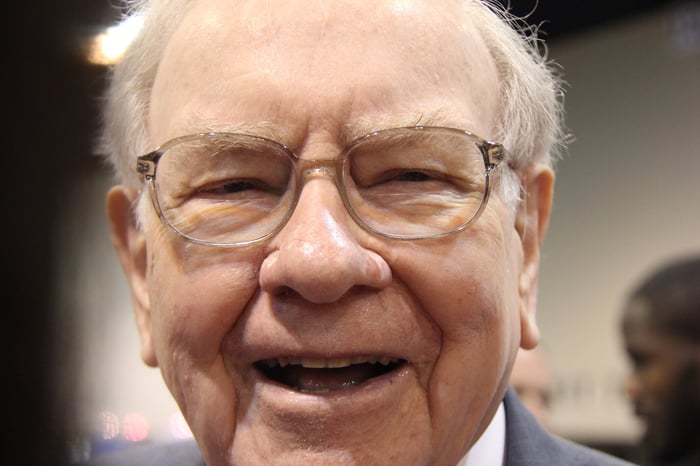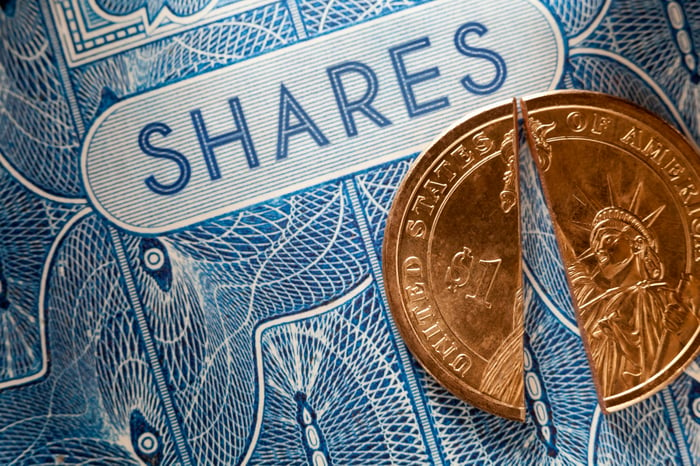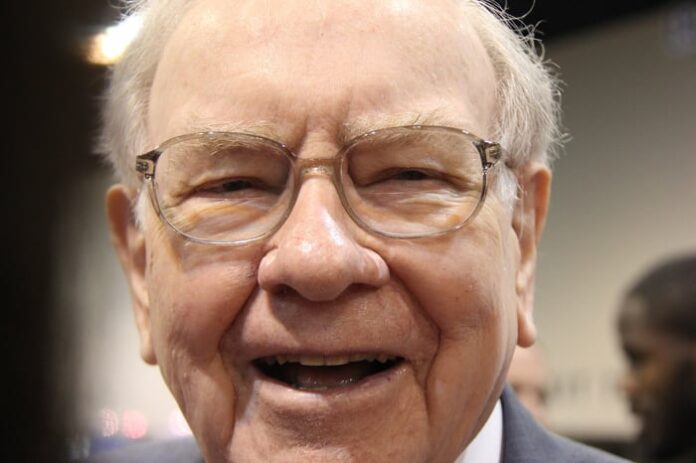Berkshire Hathaway’s Warren Buffett Continues Favorite Stock Buy Amid Major Investments
On Wall Street, few money managers attract the attention of both professional and everyday investors like Berkshire Hathaway (NYSE: BRK.A)(NYSE: BRK.B) CEO Warren Buffett. Since he became the leader in the mid-1960s, the Oracle of Omaha has nearly doubled the total annual return of the broad-based S&P 500, including dividends.
Buffett’s remarkable investment history has led many investors to follow his moves. They do this by closely examining Berkshire’s Form 13F and Form 4 filings with the Securities and Exchange Commission (SEC).

Berkshire Hathaway CEO Warren Buffett. Image source: The Motley Fool.
Form 13Fs provide a brief overview of what top money managers bought and sold in the latest quarter. These filings are required for institutional investors with at least $100 million in assets—Buffett currently manages a portfolio worth $317 billion across 43 stocks.
Berkshire Hathaway must also file Form 4 with the SEC when it buys or sells securities where it owns at least a 10% stake.
While these filings don’t completely reveal Buffett’s favorite stock, they do highlight a significant trend: the unique stock-split stock that Buffett can’t stop purchasing.
Buffett Invests Nearly $78 Billion in His “Favorite Stock”
Although Buffett’s company has large stakes in Apple, American Express, and Bank of America, the total capital Berkshire has spent on these three companies is much lower when compared to his extensive investment in what he considers his favorite stock since July 2018.
The intriguing aspect of Buffett’s favorite stock is that there’s no record of it in Berkshire Hathaway’s 13Fs. Instead, a detailed monthly account of this stock is found in Berkshire’s quarterly operating reports because his favorite stock to buy is shares of Berkshire Hathaway itself.
Before July 2018, Buffett and his longtime partner, Charlie Munger, who passed away last November, faced restrictions on buybacks. To repurchase Berkshire’s stock, shares needed to trade at or below 120% of book value—a threshold never reached.
On July 17, 2018, changes to these buyback policies were made, allowing Buffett more freedom in executing share repurchases. The new criteria permit unlimited buybacks as long as:
- Berkshire Hathaway has a minimum of $30 billion in cash, cash equivalents, and U.S. Treasuries; and
- Warren Buffett considers the company’s shares to be undervalued.
Since these modifications, Buffett has consistently bought back his company’s stock for 24 quarters in a row, including $345 million in the most recent quarter. Over six years, he has invested nearly $78 billion in repurchasing shares of Berkshire Hathaway.
This practice not only enhances the long-term value for shareholders but also helps increase the company’s earnings per share (EPS) over time.

Image source: Getty Images.
Buffett Signals Commitment to a Unique Stock-Split Investment
Given that Buffett and his team have sold stocks amounting to $131.6 billion over a seven-quarter stretch from October 1, 2022, to June 30, 2024, his $345 million investment in Berkshire’s stock during the second quarter is certainly noteworthy.
Moreover, there exists another stock that has seen even more of Buffett’s attention: Sirius XM Holdings (NASDAQ: SIRI).
Before the merger with Liberty Media’s tracking stock, Form 13Fs and Form 4s indicate that Buffett actively purchased Sirius XM shares.
Between the end of March and June, Berkshire bought 96,196,301 shares of Sirius XM. Although the exact cost per share isn’t clear, the stock traded between $25 and $31 during that period. Thus, it is reasonable to estimate that around $270 million was allocated for Sirius XM stock in the second quarter.
Berkshire also bought two classes of Liberty Media’s Sirius XM tracking stock. Form 4 filings show Buffett’s team spent $119,550,528 on Liberty Sirius XM Group Class C shares between April 4 and April 29, plus $63,840,687 for Class A shares from April 4 to April 26.
After the merger of these share classes in September, it is estimated that Buffett spent about $453 million to increase Berkshire’s stake in Sirius XM during the June-ended quarter.
This acquisition momentum continues, as recent Form 4s indicate that Buffett has invested close to $129 million more in Sirius XM.
Buffett’s growing interest in this unique stock-split investment stems from its sustainable market position and its appealing valuation against a generally high-priced stock market.
Sirius XM enjoys a unique status as one of the very few legal monopolies, being the only licensed satellite-radio operator. This status grants it significant pricing power, keeping it profitable even amid rising inflation.
Moreover, Sirius XM boasts a diverse revenue stream, with over three-quarters of its sales deriving from consistent, high-margin subscriptions. In challenging economic conditions, its revenue is likely to be more stable compared to traditional ad-supported radio competitors.
From a valuation perspective, Sirius XM also attracts Buffett’s attention. Its stock currently trades at a low multiple of approximately 7 to 8 times projected EPS for 2025, presenting a stark contrast to many leading stocks with inflated valuations. For Buffett, Sirius XM stands out as a valuable investment opportunity.
Don’t Miss This Second Chance for Investment
If you’ve ever felt you missed the chance to invest in top-performing stocks, you might want to pay close attention now.
Occasionally, our team of analysts issues a “Double Down” stock recommendation for companies poised for growth. If you’re concerned about missing your opportunity to invest, now is an ideal time before the chance slips away. The numbers speak volumes:
- Amazon: If you had invested $1,000 when we doubled down in 2010, you’d have $20,803!
- Apple: If you had invested $1,000 when we doubled down in 2008, you’d have $43,654!
- Netflix: If you had invested $1,000 when we doubled down in 2004, you’d have $404,086!
Currently, we are issuing “Double Down” alerts for three exceptional companies, and this opportunity may not present itself again soon.
See 3 “Double Down” stocks »
*Stock Advisor returns as of October 21, 2024
Bank of America and American Express are advertising partners of The Ascent, a Motley Fool company. Sean Williams has positions in Bank of America and Sirius XM. The Motley Fool has positions in and recommends Apple, Bank of America, and Berkshire Hathaway. The Motley Fool has a disclosure policy.
The views and opinions expressed herein are the views and opinions of the author and do not necessarily reflect those of Nasdaq, Inc.

